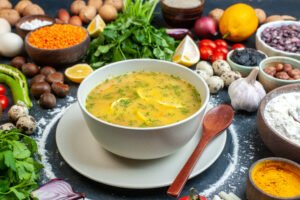
What does gastritis heartburn feel like?
Heartburn, despite its name, doesn’t actually involve the heart. Instead, it’s a burning sensation in the chest that often rises up to the throat. This fiery discomfort is caused by stomach acid backing up into the esophagus.
Alongside the burning sensation, you might experience a sour or bitter taste in the mouth. Sometimes, it’s not just a burning feeling; it can be a sharp or stabbing pain, leading to considerable discomfort.
Where is heartburn pain felt?
Heartburn pain typically manifests behind the breastbone or sternum, but it can spread upwards to the neck and throat.
This sensation can sometimes mimic the symptoms of a heart attack, leading to anxiety and confusion, especially for those experiencing it for the first time.
What is heartburn mistaken for?
Heartburn can masquerade as several other medical conditions, often leading to misdiagnosis or unnecessary panic.
Heartburn can be mistaken for various other medical conditions, including:
- Heart Attack
The symptoms of heartburn, such as chest pain or discomfort, can mimic those of a heart attack. It’s essential to differentiate between the two, as a heart attack requires immediate medical attention.
- Gallbladder Issues
Gallstones or inflammation of the gallbladder can cause symptoms similar to heartburn, including upper abdominal pain or discomfort.
- Stomach Ulcers
Ulcers in the stomach or duodenum can cause a burning sensation in the upper abdomen that may be mistaken for heartburn.
- Gastroesophageal Reflux Disease (GERD)
While heartburn is a symptom of GERD, the two conditions are not the same. GERD is a chronic condition characterized by frequent acid reflux, which can lead to complications if left untreated.
- Esophageal Spasms
Esophageal spasms can cause chest pain or discomfort similar to heartburn, but the underlying mechanism is different.
- Costochondritis
Inflammation of the cartilage that connects the ribs to the breastbone can cause chest pain similar to heartburn, especially with movement or palpation of the chest.
It’s important to consult with a healthcare professional for proper diagnosis and treatment if you experience persistent or severe symptoms that resemble heartburn, as they could indicate a more serious underlying condition.
Does Drinking Water Help Heartburn?

Drinking water might provide temporary relief from heartburn by diluting stomach acid and washing it back down into the stomach.
However, it’s not a long-term solution. In fact, consuming excessive water with meals can exacerbate heartburn by distending the stomach and increasing pressure on the lower esophageal sphincter, allowing more acid to reflux into the esophagus.
It’s essential to be mindful of hydration but not rely solely on water to manage heartburn.
What is the link between heartburn and gastritis?
Heartburn can be a symptom of gastritis, as both conditions involve inflammation of the stomach lining.
When the stomach lining is inflamed due to gastritis, it can lead to an increase in stomach acid production and weaken the lower esophageal sphincter, causing acid reflux and heartburn.
What are the Six Signs Your Heartburn Could Be Something More Serious
- Persistent Symptoms
If you experience heartburn frequently, especially multiple times a week despite making lifestyle changes or taking over-the-counter medications, it could be a sign of a more serious underlying condition such as gastroesophageal reflux disease (GERD).
- Difficulty Swallowing
Difficulty swallowing, also known as dysphagia, can be a warning sign of various conditions, including GERD, esophagitis (inflammation of the esophagus), or even esophageal cancer.
If you consistently struggle to swallow or feel like food is getting stuck in your throat, it’s essential to seek medical evaluation.
- Persistent Cough
A chronic cough that doesn’t seem to go away, particularly if it worsens at night or after eating, could be a symptom of GERD. Stomach acid refluxing into the esophagus can irritate the throat and trigger coughing.
- Regurgitation of Food or Sour Liquid
If you frequently experience the sensation of food or sour liquid regurgitating into your mouth, it may indicate a malfunction of the lower esophageal sphincter (LES), which is supposed to prevent stomach contents from flowing back into the esophagus.

- Chest Pain
While heartburn typically manifests as a burning sensation in the chest, severe or persistent chest pain that radiates to the neck, jaw, arms, or back could be a sign of a heart attack.
It’s crucial to seek immediate medical attention if you experience chest pain, especially if it’s accompanied by other symptoms such as shortness of breath, dizziness, or sweating.
- Unintended Weight Loss
Unexplained weight loss, especially when accompanied by gastrointestinal symptoms such as heartburn, could be a red flag for a more serious condition such as esophageal cancer or peptic ulcer disease.
Significant and unintentional weight loss should always be evaluated by a healthcare professional.
What does heartburn feel like in the chest?
Heartburn in the chest can vary in intensity, from a mild discomfort to a severe burning sensation.
It’s often described as a tightness or pressure behind the breastbone, sometimes extending to the throat and causing difficulty swallowing.
This feeling can worsen after eating, lying down, or bending over, making daily activities challenging for those experiencing it.
What does heartburn feel like in the stomach?
Heartburn in the stomach is characterized by a gnawing or burning sensation in the upper abdomen, just below the breastbone. This discomfort can be accompanied by bloating, belching, and a feeling of fullness.
It may intensify after consuming certain trigger foods or beverages, making mealtime a source of dread for individuals with gastritis-related heartburn.
Dealing with Gastritis Heartburn
Managing gastritis-related heartburn involves a multifaceted approach that addresses both symptoms and underlying causes.
Lifestyle modifications, dietary changes, and sometimes medication are key components of effective management.
- Identify Trigger Foods
Keeping a food diary can help identify specific foods or beverages that trigger heartburn symptoms. Common triggers include spicy foods, fatty foods, citrus fruits, caffeine, alcohol, and carbonated beverages.
Once identified, avoiding or limiting these triggers can significantly reduce the frequency and severity of heartburn episodes.
- Eat Smaller, Frequent Meals
Instead of consuming large meals, opt for smaller, more frequent meals throughout the day. Eating smaller portions helps prevent overloading the stomach, reducing the likelihood of acid reflux and heartburn.
- Avoid Eating Late at Night
Try to avoid eating within two to three hours of bedtime. Lying down shortly after eating can increase the risk of acid reflux and heartburn, as gravity isn’t helping to keep stomach acid where it belongs.
- Elevate the Head of Your Bed
Raising the head of your bed by 6 to 8 inches can help prevent nighttime heartburn. This elevation helps keep stomach acid in the stomach, reducing the likelihood of it creeping up into the esophagus while you sleep.
- Quit Smoking
Smoking can exacerbate gastritis symptoms, including heartburn. Nicotine weakens the lower esophageal sphincter, allowing stomach acid to reflux into the esophagus more easily.
Quitting smoking can significantly improve heartburn symptoms and overall digestive health.
- Manage Stress
Stress can trigger or worsen heartburn symptoms in some individuals. Practicing stress-reduction techniques such as deep breathing, meditation, yoga, or regular exercise can help manage stress levels and reduce the frequency and severity of heartburn episodes.
Dietary Strategies for Relief
In addition to avoiding trigger foods, incorporating certain dietary strategies can help alleviate gastritis-related heartburn:
- Focus on Fiber-Rich Foods
Foods rich in fiber, such as fruits, vegetables, whole grains, and legumes, can promote healthy digestion and reduce inflammation in the stomach lining.
Aim to include a variety of fiber-rich foods in your diet to support overall digestive health.
- Limit Acidic Foods
Acidic foods such as tomatoes, citrus fruits, and vinegar can irritate the stomach lining and exacerbate heartburn symptoms. Limit your intake of these foods or consume them in moderation to minimize discomfort.
- Choose Lean Proteins
Opt for lean sources of protein such as poultry, fish, tofu, and legumes instead of fatty cuts of meat, which can trigger heartburn. Lean proteins are easier to digest and less likely to cause gastrointestinal discomfort.
- Stay Hydrated
Adequate hydration is essential for overall health and digestion. Drink plenty of water throughout the day to help dilute stomach acid and promote proper digestion.
However, avoid drinking large amounts of water with meals, as this can dilute stomach acid and impair digestion, potentially worsening heartburn symptoms.
Using Gastritis Supplements
Supplements may provide additional support for managing gastritis-related heartburn, but it’s essential to consult with a healthcare professional before starting any new supplement regimen.
Some supplements that may help alleviate heartburn symptoms include:
- Probiotics
Probiotic supplements contain beneficial bacteria that can help restore balance to the gut microbiome and reduce inflammation in the stomach lining.
Look for a high-quality probiotic supplement containing a variety of strains for maximum benefit.
- Digestive Enzymes
Digestive enzyme supplements can aid in the breakdown and absorption of nutrients, potentially reducing strain on the digestive system and alleviating heartburn symptoms.
Look for a digestive enzyme supplement that contains a blend of enzymes to support overall digestive health.
- Deglycyrrhizinated Licorice (DGL)
DGL supplements have been shown to help soothe the stomach lining and reduce symptoms of gastritis, including heartburn. DGL supplements are available in chewable tablets, capsules, and powder form for convenience.
- Marshmallow Root
Marshmallow root supplements may help coat and protect the stomach lining, reducing irritation and inflammation. Look for a marshmallow root supplement that is free of additives and fillers for the best results.
Conclusion
Gastritis-related heartburn can significantly impact quality of life, but with the right approach, it’s manageable.
By making lifestyle changes, modifying your diet, and possibly incorporating supplements, you can alleviate symptoms and improve overall well-being.
Remember to consult with a healthcare professional for personalized advice and treatment options tailored to your specific needs. With patience and persistence, you can effectively deal with gastritis heartburn and enjoy greater comfort and peace of mind.












